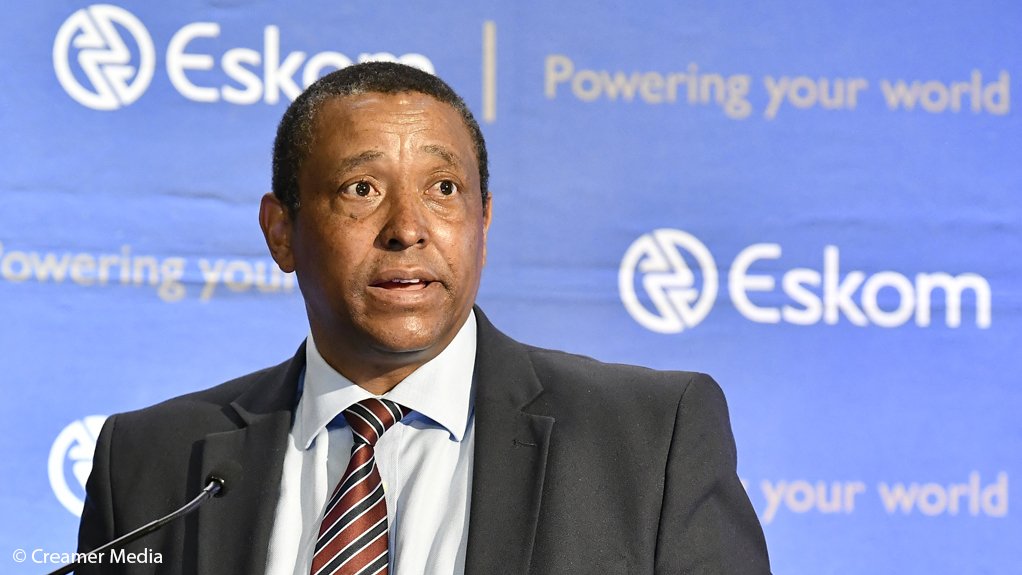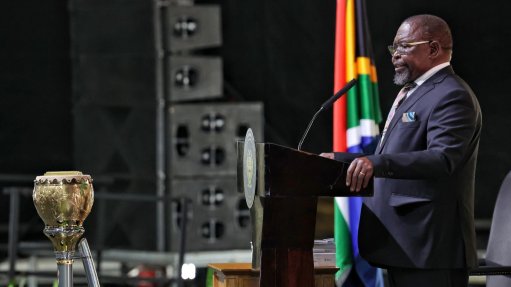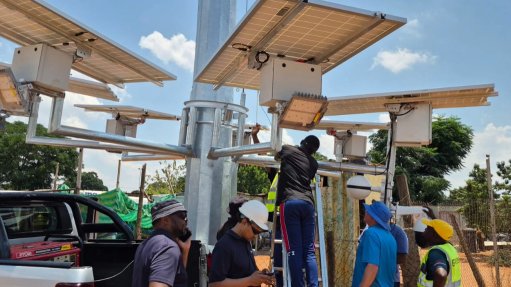Eskom seeks Nersa permission to reserve grid capacity for public IPP procurement rounds


Eskom group executive for distribution Monde Bala
Photo by Creamer Media Chief Photographer Donna Slater
The National Energy Regulator of South Africa (Nersa) has invited comment on Eskom’s application to preserve and reserve grid connection capacity for independent power producers (IPPs) participating in public procurement processes implemented in line with Section 34 of the Electricity Regulation Act (ERA).
In its application, Eskom indicates that it is seeking permission to discriminate in favour of public procurement IPP projects, at the expense of private IPP projects.
The utility argues that such discrimination has become necessary, owing to a combination of grid capacity constraints and amendments to Schedule 2 of the ERA that has “resulted in an exponential increase in applications for grid connections from IPPs with private power purchase agreements”.
As a consequence, private IPPs are moving at a faster pace to secure grid-connection capacity compared with Section 34 IPPs, which must go through a protracted Department of Mineral Resources and Energy (DMRE) procurement process.
Eskom has already implemented Interim Grid Capacity Allocation Rules (IGCAR), governed by the principle of ‘first ready, first served’ rather than ‘first come, first served’, in an effort to mitigate the risk of so-called grid hogging.
However, it argues in its submission that it is also necessary to preserve available grid capacity on the network when a public procurement programme is contemplated, and/or reserve capacity for public IPPs in specific congested areas.
“Without any form of protection, public procurement programmes remain incapable of competing with the much more agile and well-funded private sector energy procurement programmes.
“Therefore, without grid preservation/reservation in favour of the public energy procurement programmes, these programmes are likely to continue failing as evidenced by the recent failure of Bid Window 6 (BW6) of the Renewable Energy Independent Power Producer Procurement Programme.”
Eskom described the outcome of BW6 as “disappointing”, noting that the DMRE was able to award only 1 000 MW to solar PV projects, with no wind capacity procured despite a 3 600 MW allocation.
“The basis for this outcome was the uptake of available grid connection capacity by private IPPs (Schedule 2 IPPs) that had applied for budget quotations in advance of the publicly procured/section 34 IPP projects.”
Eskom group executive for distribution Monde Bala said during a briefing this week that, following BW6, Eskom had investigated various mechanisms to improve the grid allocation process, in addition to the ICGAR, which was implemented in 2023.
He noted that a curtailment addendum to the Grid Connection Capacity Assessment, which released 3 470 MW of capacity in the Eastern and Western Cape provinces for new wind generation, had been published ahead of the current application to Nersa for grid reservation and preservation.
“The reason we are applying for this grid reservation is to find a mechanism to ensure that we reserve the grid for the connections that are specifically identified as part of the [public procurement] programme,” Bala said.
The Eskom submission acknowledges upfront that the reservation and preservation being sought discriminates directly against IPPs and indirectly against those private consumers seeking to contract with such IPPs to procure “green electrons”.
It also acknowledges that it requires Nersa’s approval to proceed, given its obligations under legislation and the Grid Code to provide open and non-discriminatory access to the transmission and distribution power systems to third parties.
Nevertheless, it argues that such discrimination is in the public interest, as a continued failure of public procurement programmes will erode investor confidence, undermine government efforts to attract foreign direct investment, and frustrate ambitions related to the just energy transition and climate mitigation.
Eskom also notes that it has traditionally been designated as the buyer for the energy procured by the DMRE under Section 34 and it is, thus, duty-bound to support government’s energy procurement programmes.
“Eskom submits that this duty includes assisting the Minister in realising the purpose and the objects of Section 34 of the ERA through reservation or preservation of grid capacity for public procurement.”
Nersa released a consultation paper on the Eskom application on May 18, with a closing date for written submissions of May 25.
Article Enquiry
Email Article
Save Article
Feedback
To advertise email advertising@creamermedia.co.za or click here
Press Office
Announcements
What's On
Subscribe to improve your user experience...
Option 1 (equivalent of R125 a month):
Receive a weekly copy of Creamer Media's Engineering News & Mining Weekly magazine
(print copy for those in South Africa and e-magazine for those outside of South Africa)
Receive daily email newsletters
Access to full search results
Access archive of magazine back copies
Access to Projects in Progress
Access to ONE Research Report of your choice in PDF format
Option 2 (equivalent of R375 a month):
All benefits from Option 1
PLUS
Access to Creamer Media's Research Channel Africa for ALL Research Reports, in PDF format, on various industrial and mining sectors
including Electricity; Water; Energy Transition; Hydrogen; Roads, Rail and Ports; Coal; Gold; Platinum; Battery Metals; etc.
Already a subscriber?
Forgotten your password?
Receive weekly copy of Creamer Media's Engineering News & Mining Weekly magazine (print copy for those in South Africa and e-magazine for those outside of South Africa)
➕
Recieve daily email newsletters
➕
Access to full search results
➕
Access archive of magazine back copies
➕
Access to Projects in Progress
➕
Access to ONE Research Report of your choice in PDF format
RESEARCH CHANNEL AFRICA
R4500 (equivalent of R375 a month)
SUBSCRIBEAll benefits from Option 1
➕
Access to Creamer Media's Research Channel Africa for ALL Research Reports on various industrial and mining sectors, in PDF format, including on:
Electricity
➕
Water
➕
Energy Transition
➕
Hydrogen
➕
Roads, Rail and Ports
➕
Coal
➕
Gold
➕
Platinum
➕
Battery Metals
➕
etc.
Receive all benefits from Option 1 or Option 2 delivered to numerous people at your company
➕
Multiple User names and Passwords for simultaneous log-ins
➕
Intranet integration access to all in your organisation


















